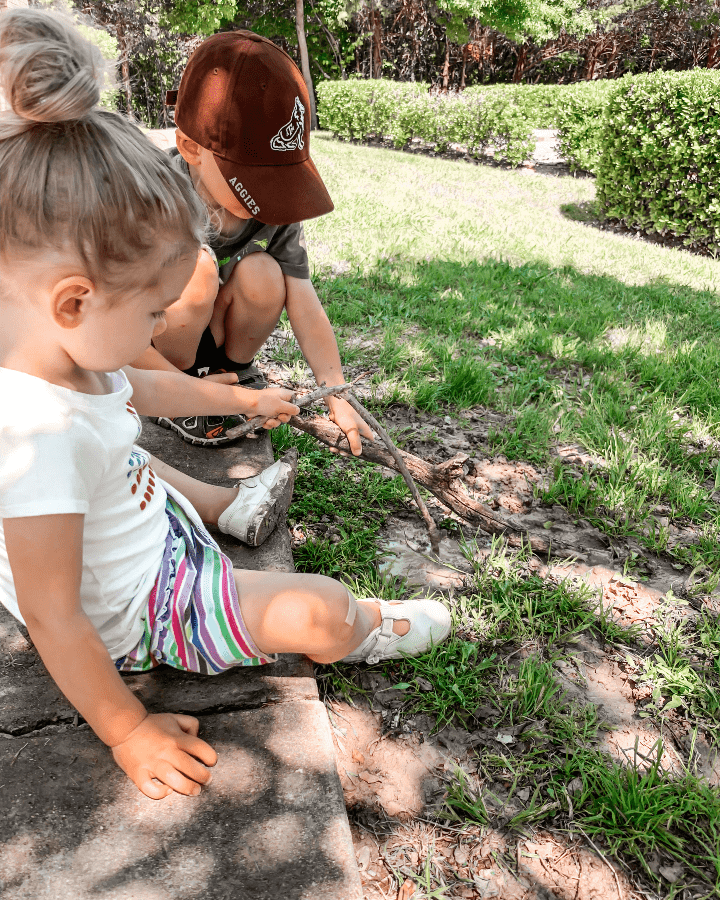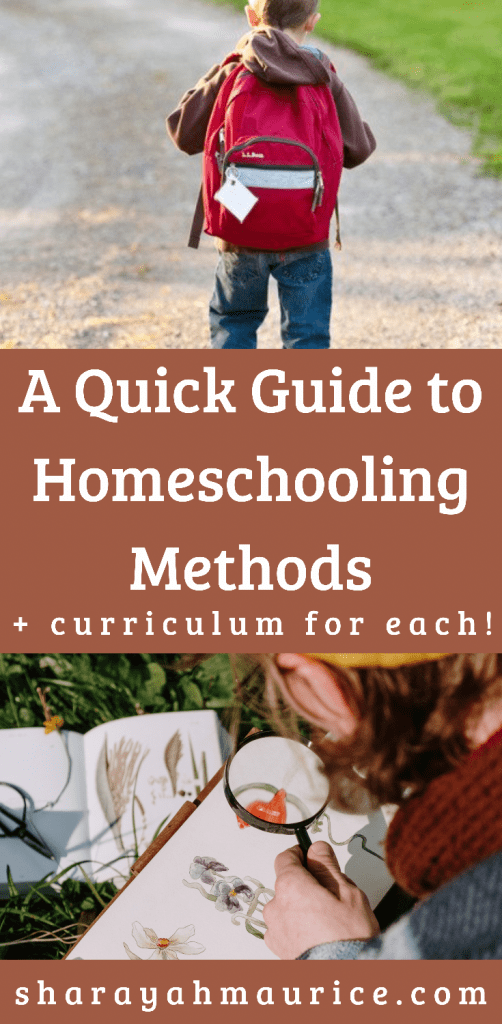Today let’s talk about and compare the various types of homeschooling methods and some popular associated curricula to help get you started on your homeschooling journey.

**UPDATE** Sharayah Maurice is no longer actively sharing her homeschool journey online. While she is still homeschooling her three children, she has decided to focus on her book publishing in her free time instead. Any homeschool-related posts on her website will remain in a closed system (meaning you won’t be able to find other homeschool-related posts on her site unless you have a specific web address for that post–most commonly found on her YouTube channel.) The videos on her YouTube channel will also be left up to continue to help and encourage other homeschooling families but bear in mind there will be no future updates and comments will not be returned.
First of all, this is by no means an exhaustive explanation of each popular homeschooling method out there. My hope in writing this guide is that it helps you choose a starting point. So from there, I encourage you to dig deeper into one or all these homeschooling methods as the explanations I give cannot adequately describe an entire method into one short paragraph. I only hope to help you in selecting a starting point for your own, further research.
Traditional Method
First let’s talk Traditional. Traditional homeschooling is most similar to what you think of at your local public school. Think a school at home approach. So this method uses textbooks and workbooks to teach. Typically, the student is on a 12 year timeline from kindergarten to graduation. Essentially, parents re-create the classroom and all it encompasses, at home. This is a very structured, if not the most structured approach to education.
Some curriculums that work well with this method include:
Christian Perspective
- A Reason For
- Abeka Academy
- BJU
- Christian Liberty Press
- Master Books
- Memoria Press
- Rod and Staff
Non-Christian
- Easy Grammar Systems
- Explode the Code
- Hooked on Phonics
- Learning Without Tears
- Saxon
- Singapore Math
Classical Method
The classical method is a systematic approach to learning. Therefore it follows a specific, three part pattern of training the mind. This process begins with the grammar stage which encompasses memorization of facts in every subject. Then there is the dialectic stage or logic stage, where critical thinking becomes the focus of each subject. Finally, the rhetoric stage builds upon the first two, where the student then synthesizes the knowledge acquired and learns to articulate their own ideas and opinions both verbally and orally.
Curriculum that is classical in its approach include:
Christian Perspective
- Classical Academic Press
- Classical Conversations
- Memoria Press
- Story of the World
Non-Christian
- Singapore Math
Charlotte Mason Method
The Charlotte Mason method comes from the British educator, Charlotte Mason. The basic philosophy behind this method is that children are capable of dealing with ideas and knowledge rather than being fed condensed material from dry textbooks. Therefore, children are encouraged to read from living books or quality books that bring the subject to life. There is an emphasis on narration, nature study and habit training, all done in short lessons for maximum attention.
Charlotte Mason style curriculum include:
Christian Perspective
- Apologia
- Master Books
Non-Christian
- Life of Fred
Unit Studies
Next we have Unit Studies. Unit studies keep a consistent theme across all subjects of study. So through this approach, a topic is chosen for study and children learn all subjects as they relate to the unit. I wrote a post all about Unit Studies and how you can create your own if you are interested, here.
Curriculum that works well with Unit Studies are:
Christian Perspective
- Apologia
- Progeny Press
- Ramsey Education
- Story of the World
- Gather Round Homeschool
Non-Christian
- None
Unschooling
Unschooling is the idea that children are learning through all interactions. Instead of a set structure of curriculum, parents provide an abundance of learning opportunities. This would include access to a variety of books, learning activities such as field trips, and hands-on manipulatives to assist in the learning process. In this method, children follow their own natural curiosity while the teacher guides them to the appropriate answers. In the spectrum of structured education, this method would be the least structured in its approach.
Since curriculum is not heavily relied upon in this method, there are little to no curriculums that can be suggested. A library card is your best option!
Eclectic
This method is for those who can’t pick just one of the homeschooling methods. This educational philosophy encompasses all the above. Families who claim to be eclectic often pull what they like from each of the various educational methods and combine it into a unique plan that fits their specific family and lifestyle.
You could take a very traditional approach to mathematics with Saxon math while at the same time creating learning opportunities for the study of history through field trips to historical sites in an unschooling style. Feel free to pick and choose what works for you and leave what doesn’t with this philosophy!
And there you have it friends! For those who want to know, I follow a classical approach with a Charlotte Mason twist. Also, I like to incorporate a few Unit Studies – just for good measure 😉 Can you say Eclectic??
Pin for Later


Leave a Reply